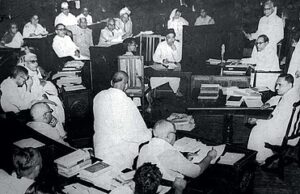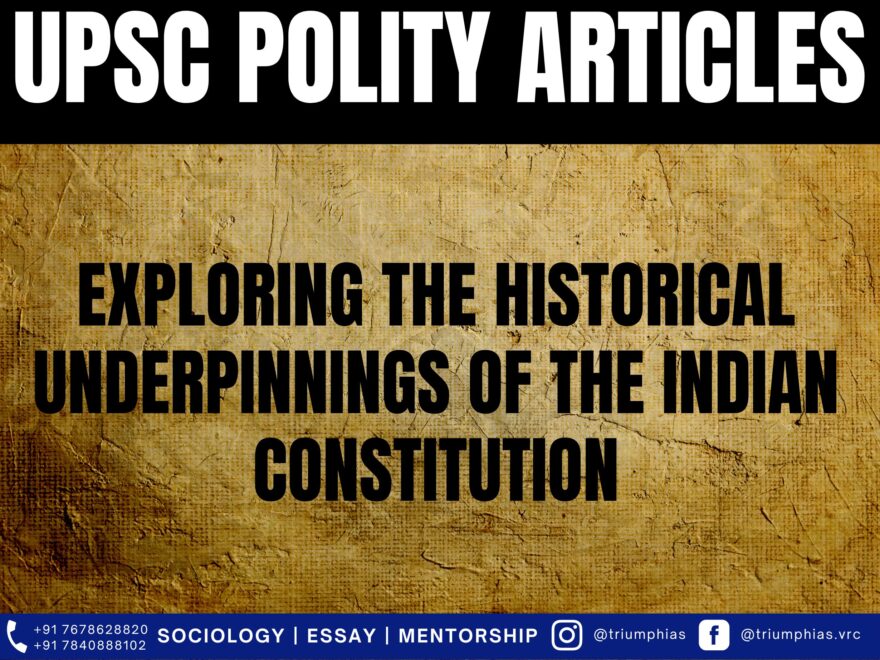Indian Constitution: Historical Underpinnings
(Relevant for Polity Section of General Studies Paper Prelims/Mains)

Indian constitution: Historical underpinnings
India, renowned as the globe’s largest democracy, successfully gained liberation from British colonial rule in 1947. The year 1950 marked the establishment of the Indian Constitution, a foundational document that delineates the structure of the nation’s governance. The Constitution is built upon a profound heritage of Indian political and social philosophy and mirrors the nation’s historical journey.
Historical Underpinnings of the Indian Constitution
The historical foundations of the Indian Constitution can be traced to a variety of origins, encompassing indigenous customs, colonial encounters, and Western political philosophy.
Indigenous Traditions: The Constitution is enriched by insights drawn from India’s ancient and medieval political and societal traditions. Ancient texts like the Vedas, Upanishads, and Dharmashastras shed light on governance dynamics, rights, and responsibilities. The principles of non-violence, tolerance, and equality from Buddhist and Jain teachings also left an imprint on the Constitution’s formation. Furthermore, the emphasis on individual liberty and spiritual equality from the medieval Bhakti movement resonates within the Constitution.
Colonial Experiences: The influence of British colonial rule on the Constitution is profound. The Indian National Congress and other movements during this era drew upon Western concepts of freedom, democracy, and constitutional principles. The Montagu-Chelmsford Reforms of 1919 and the Government of India Act of 1935 laid the groundwork for the eventual drafting of the Constitution.
Western Political Thought: The Constitution is a blend of Western political thought, particularly embracing notions of liberal democracy and the separation of powers. The framers of the Constitution found inspiration in the American and French Constitution, as well as the British parliamentary system. Socialist and Gandhian ideals, such as economic justice and non-violence, are also woven into the Constitution.
Influence on Constitutional Evolution: The historical foundations have significantly shaped the evolution of the Indian Constitution, spanning from its initial creation to subsequent amendments.
Constitution Drafting: The Constituent Assembly, entrusted with crafting the Constitution, drew from India’s diverse historical and social tapestry. Members of the Assembly, hailing from different regions and backgrounds, contributed their distinct viewpoints and traditions. Debates during the drafting phase mirror the impact of indigenous practices, colonial experiences, and Western political thought.
Incorporation of Fundamental Rights: The Constitution’s fundamental rights echo India’s historical heritage of personal freedom and social equity. The right to life, liberty, and equality before the law is rooted in Dharmashastras and the Bhakti movement’s pursuit of spiritual parity. Inclusion of religious freedom and cultural and educational rights mirrors India’s multifaceted societal fabric.
Constitutional Amendments: Amendments to the Constitution reflect shifts in India’s political and social landscape. The incorporation of Directive Principles of State Policy in the preamble, inspired by Gandhi an and socialist visions, showcased post-independence aspirations. Likewise, the 73rd and 74th Constitutional Amendments of 1992, empowering local governance, underscored India’s commitment to grassroots democracy.
Landmark Court Judgments: Key Supreme Court judgments have molded the evolution of the Indian Constitution:
The Kesavananda Bharati case (1973) established the “basic structure” principle, safeguarding core Constitutional aspects from amendment. The Minerva Mills case (1980) upheld judicial review and invalidated certain provisions of the Constitution
The historical underpinnings of the Indian Constitution reflect India’s diverse social and political experiences. The Constitution draws on India’s indigenous traditions, colonial experiences, and Western political thought, and has evolved through amendments to reflect changing aspirations and challenges. Despite this the Constitution remains a living document, reflecting India’s democratic and pluralistic ethos.
Sample Question for UPSC Sociology Optional Paper:
Question 1: How did the indigenous traditions of India influence the formation of the Indian Constitution?
Answer: Indigenous traditions like the teachings from Vedas, Upanishads, and Dharmashastras have influenced the Indian Constitution by emphasizing governance dynamics, rights, and responsibilities. Principles of non-violence, tolerance, and equality from Buddhist and Jain teachings are also embedded in the Constitution.
Question 2: What role did colonial experiences play in shaping the Indian Constitution?
Answer: British colonial rule left a profound impact, introducing India to Western concepts of freedom, democracy, and constitutional principles. Notably, the Montagu-Chelmsford Reforms and the Government of India Act of 1935 served as groundwork for the eventual drafting of the Constitution.
Question 3: How have landmark Supreme Court judgments affected the Indian Constitution?
Answer: Landmark judgments like the Kesavananda Bharati case established the “basic structure” principle, safeguarding core Constitutional aspects from amendment. The Minerva Mills case upheld the importance of judicial review and invalidated certain constitutional provisions, further shaping its evolution.
Question 4: What elements of Western political thought are visible in the Indian Constitution?
Answer: The Indian Constitution incorporates elements of Western political thought, specifically liberal democracy and the separation of powers, inspired by the American and French Constitutions and the British parliamentary system.
Question 5: How has the Indian Constitution evolved post-independence through amendments?
Answer: Post-independence amendments like the Directive Principles of State Policy in the preamble and the 73rd and 74th Constitutional Amendments of 1992, for local governance, reflect shifting social and political landscapes, and aspirations of grassroots democracy.
To master these intricacies and fare well in the Sociology Optional Syllabus, aspiring sociologists might benefit from guidance by the Best Sociology Optional Teacher and participation in the Best Sociology Optional Coaching. These avenues provide comprehensive assistance, ensuring a solid understanding of sociology’s diverse methodologies and techniques.
Indian Constitution, history, indigenous traditions, colonial rule, Western political thought, Constituent Assembly, fundamental rights, constitutional amendments, landmark judgments, democracy,

Choose The Best Sociology Optional Teacher for IAS Preparation?
At the beginning of the journey for Civil Services Examination preparation, many students face a pivotal decision – selecting their optional subject. Questions such as “which optional subject is the best?” and “which optional subject is the most scoring?” frequently come to mind. Choosing the right optional subject, like choosing the best sociology optional teacher, is a subjective yet vital step that requires a thoughtful decision based on facts. A misstep in this crucial decision can indeed prove disastrous.
Ever since the exam pattern was revamped in 2013, the UPSC has eliminated the need for a second optional subject. Now, candidates have to choose only one optional subject for the UPSC Mains, which has two papers of 250 marks each. One of the compelling choices for many has been the sociology optional. However, it’s strongly advised to decide on your optional subject for mains well ahead of time to get sufficient time to complete the syllabus. After all, most students score similarly in General Studies Papers; it’s the score in the optional subject & essay that contributes significantly to the final selection.
“A sound strategy does not rely solely on the popular
Opinion of toppers or famous YouTubers cum teachers.”
It requires understanding one’s ability, interest, and the relevance of the subject, not just for the exam but also for life in general. Hence, when selecting the best sociology teacher, one must consider the usefulness of sociology optional coaching in General Studies, Essay, and Personality Test.
The choice of the optional subject should be based on objective criteria, such as the nature, scope, and size of the syllabus, uniformity and stability in the question pattern, relevance of the syllabic content in daily life in society, and the availability of study material and guidance. For example, choosing the best sociology optional coaching can ensure access to top-quality study materials and experienced teachers. Always remember, the approach of the UPSC optional subject differs from your academic studies of subjects. Therefore, before settling for sociology optional, you need to analyze the syllabus, previous years’ pattern, subject requirements (be it ideal, visionary, numerical, conceptual theoretical), and your comfort level with the subject.
This decision marks a critical point in your UPSC – CSE journey, potentially determining your success in a career in IAS/Civil Services. Therefore, it’s crucial to choose wisely, whether it’s the optional subject or the best sociology optional teacher. Always base your decision on accurate facts, and never let your emotional biases guide your choices. After all, the search for the best sociology optional coaching is about finding the perfect fit for your unique academic needs and aspirations.
To master these intricacies and fare well in the Sociology Optional Syllabus, aspiring sociologists might benefit from guidance by the Best Sociology Optional Teacher and participation in the Best Sociology Optional Coaching. These avenues provide comprehensive assistance, ensuring a solid understanding of sociology’s diverse methodologies and techniques. Sociology, Social theory, Best Sociology Optional Teacher, Best Sociology Optional Coaching, Sociology Optional Syllabus.
Best Sociology Optional Teacher, Sociology Syllabus, Sociology Optional, Sociology Optional Coaching, Best Sociology Optional Coaching, Best Sociology Teacher, Sociology Course, Sociology Teacher, Sociology Foundation, Sociology Foundation Course, Sociology Optional UPSC, Sociology for IAS,
Follow us :
🔎 https://www.instagram.com/triumphias
🔎https://www.youtube.com/c/TriumphIAS
https://t.me/VikashRanjanSociology
Find More Blogs
|
Scope of the subject and comparison with other social sciences |
|||
|
|
|
|
Modernity and social changes in Europe |

